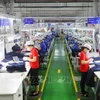From 2014 Vietnamese non-sensitive footware products exported to the European Union will enjoy zero tax rate, while tax rates applied for products in that list will decrease by 3.5 percent from the former rates. According to the Vietnam Economic News, this is seen as a golden opportunity for the country's footwear industry but the newspaper also warned that it is not easy to seize that opportunity.
The EU is currently still a large export market of Vietnam’s leather and footwear industry, only behind the North America market. In 2013, export revenues of Vietnam’s leather and footwear products to the EU reached 3.41 billion USD, of which the revenue of footwear products was 2.88 billion USD, accounting for 8.5 percent of the EU’s market share.
Notably, right after the new Generalised System of Preferences (GSP) regulations officially took effect, export revenues of Vietnam’s footwear products to some EU markets in January 2014 increased sharply compared to the same time last year like Poland up 173.53 percent, Spain 29.35 percent, Czech Republic 14.13 percent and Italy 9.54 percent.
Vietnam Leather and Footwear Association Secretary General Phan Thi Thanh Xuan said the prospect for Vietnam’s footwear export to the EU in the coming years is quite open as some products that are out of the sensitive product list exported to the block will enjoy zero tax rate, while tax rates applied for products in that list will decrease by 3.5 percent from the former rates.
Tran Ngoc Quan, Deputy Head of the European Market Department under the Ministry of Industry and Trade said according to EU’s new criteria, the market share of Vietnam’s footwear products will be widened, which means Vietnamese footwear businesses will have opportunities to boost exports and sources of FDI capital flowing into the industry will also increase significantly.
However, Phan Thi Thanh Xuan also warned that GSP is a golden opportunity but not easy to seize and the footwear industry needs to be aware of several issues before implementing the new GSP regulations. GSP helps Vietnam raise its exports to the EU but also worries producers inside the block about the possible decreased market shares. Therefore, they might put pressure on the EU to impose new rigid protection regulations or non-tariff technical barriers. Moreover, the GSP original rules encourage the import of materials from EU member countries at higher prices compared with those from China or the Republic of Korea, resulting in lower competitiveness and production efficiency. Meanwhile, the material localisation rate of domestic footwear businesses is about more than 50 percent.
In addition, the GSP Plus will allow Pakistan's exports, including footwear products to the EU at zero tariff and are not subjected to the “mature” mechanism. This will surely create high competitive pressure for the Vietnamese products.
Tran Ngoc Quan pointed out that Vietnam’s real footwear export is quite high and predicted to grow strongly in the coming period. Meanwhile, the China’s market share has reduced (not enjoying the GSP regulations) therefore Vietnam is very likely to surpass the “mature” mechanism limit and by then it will no longer enjoy preferential treatment under the bloc's GSP.
Footwear businesses have been recommended to find every possible ways to gain more EU’s market share, keep regular contacts with Ministry of Industry and Trade (MOIT) to update the EU-Vietnam Free Trade Agreement negotiation process (EVFTA) for flexible adjustments and campaign the EU for further GSP grants to Vietnam.
To ensure a long-term export growth for the leather and footwear industry, Vietnam Leather and Footwear Association petitioned the MOIT and other relevant units to complete the EVFTA soon to replace the GSP, with a roadmap to reduce import tax rate to zero percent which ensures footwear export stability to the EU.-VNA
The EU is currently still a large export market of Vietnam’s leather and footwear industry, only behind the North America market. In 2013, export revenues of Vietnam’s leather and footwear products to the EU reached 3.41 billion USD, of which the revenue of footwear products was 2.88 billion USD, accounting for 8.5 percent of the EU’s market share.
Notably, right after the new Generalised System of Preferences (GSP) regulations officially took effect, export revenues of Vietnam’s footwear products to some EU markets in January 2014 increased sharply compared to the same time last year like Poland up 173.53 percent, Spain 29.35 percent, Czech Republic 14.13 percent and Italy 9.54 percent.
Vietnam Leather and Footwear Association Secretary General Phan Thi Thanh Xuan said the prospect for Vietnam’s footwear export to the EU in the coming years is quite open as some products that are out of the sensitive product list exported to the block will enjoy zero tax rate, while tax rates applied for products in that list will decrease by 3.5 percent from the former rates.
Tran Ngoc Quan, Deputy Head of the European Market Department under the Ministry of Industry and Trade said according to EU’s new criteria, the market share of Vietnam’s footwear products will be widened, which means Vietnamese footwear businesses will have opportunities to boost exports and sources of FDI capital flowing into the industry will also increase significantly.
However, Phan Thi Thanh Xuan also warned that GSP is a golden opportunity but not easy to seize and the footwear industry needs to be aware of several issues before implementing the new GSP regulations. GSP helps Vietnam raise its exports to the EU but also worries producers inside the block about the possible decreased market shares. Therefore, they might put pressure on the EU to impose new rigid protection regulations or non-tariff technical barriers. Moreover, the GSP original rules encourage the import of materials from EU member countries at higher prices compared with those from China or the Republic of Korea, resulting in lower competitiveness and production efficiency. Meanwhile, the material localisation rate of domestic footwear businesses is about more than 50 percent.
In addition, the GSP Plus will allow Pakistan's exports, including footwear products to the EU at zero tariff and are not subjected to the “mature” mechanism. This will surely create high competitive pressure for the Vietnamese products.
Tran Ngoc Quan pointed out that Vietnam’s real footwear export is quite high and predicted to grow strongly in the coming period. Meanwhile, the China’s market share has reduced (not enjoying the GSP regulations) therefore Vietnam is very likely to surpass the “mature” mechanism limit and by then it will no longer enjoy preferential treatment under the bloc's GSP.
Footwear businesses have been recommended to find every possible ways to gain more EU’s market share, keep regular contacts with Ministry of Industry and Trade (MOIT) to update the EU-Vietnam Free Trade Agreement negotiation process (EVFTA) for flexible adjustments and campaign the EU for further GSP grants to Vietnam.
To ensure a long-term export growth for the leather and footwear industry, Vietnam Leather and Footwear Association petitioned the MOIT and other relevant units to complete the EVFTA soon to replace the GSP, with a roadmap to reduce import tax rate to zero percent which ensures footwear export stability to the EU.-VNA



















